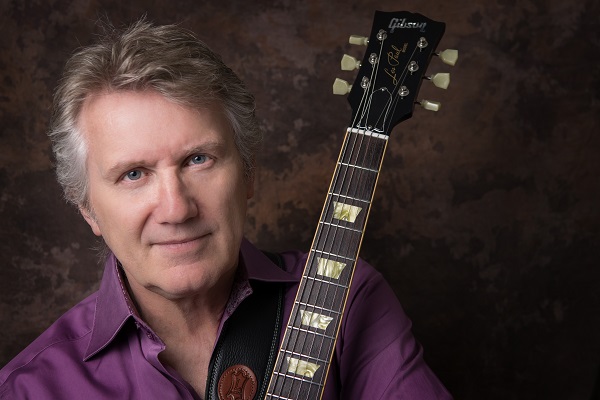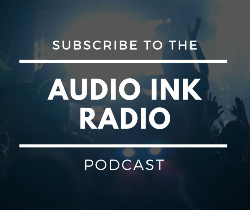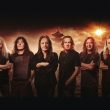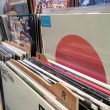Rik Emmett of Triumph on Going Digital, Upcoming Documentary + More – Interview

Rik Emmett – Story by Anne Erickson, courtesy photo
Legendary Triumph guitarist and vocalist Rik Emmett joins Anne Erickson to discuss his solo catalog going digital, the upcoming Triumph documentary, David Lee Roth memories and more in this in-depth interview
Rik Emmett is a prolific songwriter, not only with Canadian rockers Triumph, but also as a longtime solo artist. In that spirit, 11 of Emmett’s popular solo albums were recently released digitally for the first time via Round Hill Records, bringing new life to the classic catalog. The solo albums come amid more projects for Emmett, including writing a book of poetry, an autobiography (possibly more than one) and an upcoming Triumph documentary.
Emmett joined Anne Erickson of Audio Ink Radio for a video discussion about his solo catalog, the much-anticipated Triumph documentary, the state of rock music, David Lee Roth memories and more. Watch the full video interview below, and read the interview via the feature.
Anne Erickson: Congratulations on releasing your solo albums digitally for the first time. Looking back through your catalog, is there a release that really stands out to you?
Rik Emmett: It depends on what you’re looking for. For people that know Rik Emmett for being a hard rock guy in Triumph, they would gravitate towards “Liberty Manifesto,” which I did with Mike Shotton. It sold well in Japan and Germany, but didn’t do hardly anything in North America, so that would be the hard rock one, and that was very hard rock. It was a lot of layering of guitars and voices– Queens meets Rush meets Triumph. It was in that ballpark. But, there are classical guitar records people use when having a nice white wine dinner or canoodling on the couch. The first record I made when I went indie was called “Ten Invitations,” and that was mostly classical guitar pieces and instrumentals. But, personally, if I was going to pick one of my favorites, I might pick “Swing Shift.” I did three records in a sort of trilogy, one classical, and then a jazz-swing one, and then blues stuff. The writing on “Swing Shift” was moving towards smooth jazz, kind of my roots from when I played in college, so personally, that one feels like one that appeals to me a lot.
How have you been doing during this whole lock down period?
It’s been ridiculous. January of 2019, I said, you know, I don’t want to go on the road anymore. I might drive to a gig or two, and I sort of told my Canadian agent, you can book a few little things here and there, but give me, like, at least six months– maybe a year. So, I had pulled off the road and sort of started to get used to retiring, but I didn’t retire from being creative. I would be in my basement studio, and I got this sort of thing up on my blog about wanting to do a record like a Bob Dylan album that I had in 1963 that was just called “Bob Dylan.” It was just voice and guitar. And, I went, well, I’m going to do a project like that.
I got an engineer friend in, and I started doing that. I was writing lyrics first and wasn’t touching a guitar– was just literally focused on writing lyrics, which is a very Bob Dylan kind of approach. The music would form in my head. I would have an understanding of phrasing and certain things I was hearing in my head and musically, but literally, never picked up a guitar until I had the lyrics finished. That was new for me. But then, of course, I can’t stop there. I wrote six finger-style guitar jazz pieces, and I added those. So there are 24 tracks. I called that, “Folk Songs for the Farewell Bonfire,” because I was thinking that might be the last thing I record– this might be the last project that I do.
So, I did that, but then I was getting tired of that. When you write lyrics, there’s a lot of discipline involved, because you have to match meter– you write a verse now, the next verse has to match it. Your rhyme scheme has to remain very straight and true to all of that. So, I got to the point where I was going, I would like to be able to write some things. I was just writing in my notebooks things that were more like poetry than lyrics, and before I knew it, I was amassing this stuff. So, I had a friend, and he knew a guy that was an editor publisher in Toronto. I sent him the stuff and he said, this is great. We want to put this out. So, not only do I have this new album out, but I have a book of poetry that’s coming out.
That’s so great. So, you have a book of poetry coming out, on top of the digital solo albums. Is there anything else on the horizon?
Well, publishers being what publishers are, they said, “Rick, you’ve really got that Irish gift of the gab. Would you like to do an autobiography? Because, you know, poetry is like jazz. We can’t make a lot of money selling an autobiography. We could maybe make some money.” I go, “Yeah. Alright.” So, it looks like there’s a two-book deal that’s cooking. Meanwhile, here’s Round Hill, and they’re putting out this stuff, and now I’m doing all these interviews and things and because of the COVID-19 pandemic. You get a lot of requests from people. They want to do this, they want to do Zoom things, they want to do a masterclass. I did a couple of days of songwriting workshops about a month ago, and I’m going to be doing this thing called “Six String Salute,” which is to raise money for the road crew guys and stuff. It’s like retirement actually ended up being an incredibly good career move! (Laughs)
You mentioned an autobiography. Is that happening for sure?
Well, it’s certainly a for sure dream in a few people’s heads. Do I have it written yet? No, but here’s the thing. You’re in social media, Anne, so you’ll appreciate this. I have a website where I have a members’ forum, and I’ve had a website pretty much since the Internet began, because I had fans that had come to me and said, Hey, this Internet thing is happening. We’d love to do a website. Well, okay, but you can’t own it. It’ll be mine. I’ll have to have control. I’ll have to sort of be a benevolent dictator, but okay. (Laughs) So, that’s how it got started. It’s been around for a long, long time. My website administrator, Adrian, I sent her an email a few months back and said, “Hey, Adrian, can you compile all the posts that I’ve done on the members forum since it began and put it into a Word document and send it to me, because there’s this thing about an autobiography.” She sent me the thing single-spaced, and it was 5,500 pages.
So, I’m starting to think now, not just one autobiography– I’m thinking of breaking it up into a series of three or four books, because I have thousands and thousands of pages of raw material that I can draw upon. Obviously, it’ll be a lot smaller than that, and there’s probably a lot of stuff– I get people that ask me things like, what strings do you use? That’s not exactly what you want to put in an autobiography. People want to hear about how drunk David Lee Roth actually was at the US Festival– those things.
So, how drunk was David Lee Roth at the US Festival? (Laughs)
Well, they were all pretty happy! (Laughs) Part of it was– I love the story. US Festival was this incredibly rare event where everybody was getting paid. Van Halen was getting a million dollars to play this thing. They had a compound built backstage, and it looked like sort of “Lord of the Flies.” It looked like a fort that had upright, wooden sticks, palisade all around the outside with a moat. So, it was like, don’t come here. This is the Van Halen camp. But, of course, they had Hollywood actresses and Eddie was with Valerie Bertinelli at the time. So, there were all of these Hollywood people, showbiz folks, that were coming and going from this compound. You could just imagine the bacchanal that was happening inside there! (Laughs) And they were on last. So, this day was filled with Judas Priest and and Ozzy and Quiet Riot. We played in the middle of the afternoon. Van Halen was just sitting around, and they were getting happy. Getting pickled! So, by the time they had to go on, they could hardly walk! (Laughs) I think getting out under the lights and starting to play, it sort of sobers you up a little bit. They didn’t do too bad once they got up there, but I think they’d even admit, Well, we were having a nice party that day. We were making a lot of money.
That’s such a great story. What year was that?
That was 1983. You probably weren’t even born yet!
Something else that people are looking forward to is this Triumph documentary. Have you seen the whole thing yet?
I saw a rough cut — well, I wouldn’t say rough cut, I think I saw the final edit – just a couple of days ago. There are still a few little things they’ve got to clean up, some titling that goes at the bottom, and they have some animation sequences that sort of get you from one thing to another, and they’re not quite finished up yet. But, it’s exceptional. It’s really something. It’s very surreal. It’s like, this is your life, Rik. But, it’s one person’s — well, two people, really — the editor Mark and Sam Dunn, who’s the Banger Films guy. He’s really smart, and he really knows his stuff. He’s told the stories of so many other bands, that now, he sort of realizes, I’ve got to focus this down and figure out what is the story that I want to tell about this band.
It’s only going be the one story. It’s not going to be my story, and it’s not going to be Michael Levine’s story or Gil Moore’s story. It’s going to be what Sam has decided he’s going to tell from the research that he’s done and the stuff that he’s garnered and the footage that’s available. It’s a compelling story, and it’s kind of weird to see it, sort of the rise, the fall, the rise again, and then the end, all the Walk of Fame and all of the lovely things, and now, the making of this documentary. We did a fan fest, which was a thing where they could shoot fans seeing the band, and we rehearsed, and the band actually played three songs live for these fans that they flew in from all over the world. That was unbelievable. That was just an insane kind of emotional thing for us to reunite and play that. It was kind of like the capper of all the story, coming back around full circle and finishing in a really good, positive, solid way. The documentary crew captured it all on two dozen cameras from every angle. So, it’s something, for sure.
Do you think that you guys would ever share the stage again, maybe after coronavirus as a big celebration for everything being back to normal?
I doubt it. There are several reasons. I’m not getting any younger, and I’m not sure I could sustain singing a rock show for 75 minutes, 90 minutes, whatever it would have to be. But, the bigger thing is the drummer Gil. I mean, he sang a lot of the material too, and drummers, once they get to the other side of 65, they start having back problems and elbow problems, and it’s really difficult for drummers to keep it going. So, it’s not like it hasn’t been done. It’s not like you don’t see Queen, and it’s really only two of the original guys, and then there’s this host of other guys, four or five other people that are helping out. And, of course, they’ve got Adam Lambert out there singing, and it’s like, okay, it’s amazing, and it’s great, but the roles… Brian May place a pretty heavy duty role in it, and he’s amazing. But, Roger Taylor, there’s another drummer that’s kind of helping him out back there. He is singing some of the harmonies, but I’m not sure he’s singing the really, really, really high ones that he used to sing back in the day. I don’t know. The other thing is, I hate to age myself, but I like having the opportunity to sit around the pool with my grand kids. I think I’ve had a fairly eclectic, prolific kind of a life, and even though I’m still being creative, I think of the creativity now as a hobby. If I had to go back out on the road and go through the grind of hotels, airplanes, Ubers, limos, all that stuff again, I think that would just– it would probably kill me. I don’t want him to die yet! (Laughs)
Would you be open to doing one song or something like that with the guys of Triumph?
That’s possible. I think I wrote a song once on an album, “Never Say Never,” and I still hold to that philosophy. You never know what’s going to happen, and you never know what kind of opportunities will arise. So, I would never say never, but, I would say it’s unlikely. Maybe one song. Maybe a TV thing, or if it was something for a movie or something, it’s possible. But I don’t know.
When you were first starting out with Triumph, did you have any idea that you guys would have the kind of success that you did?
Hope springs eternal, right? I think when you start off anything, I think everybody starts off and you have the best intentions. You dream big. Then the reality sets in, and the hard work starts, but then little things will happen along the way. In the first few years of the band, it would be enough that it was like, let’s keep this going. Then, around the four or five year mark, some really good things started to happen. Then you start to go, “Wow, this could really happen.” The dream that you had is now it’s altering, but it’s also getting fueled, so that now you feel like, this is within reach. I think I always had a positive attitude. The band was called Triumph! (Laughs)
One of the things the documentary will make very clear to everybody is that Gil Moore has this tremendous resource. He’s extremely persistent. He’s very, very focused and ambitious and driven, even more than I am. I feel like I’m a fairly focused, ambitious kind of guy, but it’s more about creativity for me. I would fight to the death about a song of mine, whereas Gil would fight to the death to get on a billing and a show in San Diego on a Thursday night. He just was really, really strong willed. I think that’s a part of it, that he never lost sight of, I’m going for this. We are going for it. He was the guy that picked the name! So, the band reflected a great deal of his steely resolve.
What are your thoughts on the state of rock music? Do you think that rock is in a good place today?
I do. We live, obviously, let’s forget about the sort of COVID-19 and the implications of that, and let’s just talk about the fact that during the course of my lifetime, we made the transition from an analog world to a digital universe, and we all live in that world. You and I are here talking, and it’s bits and bytes flowing through fiber optic cable at the speed of light. We’re bouncing stuff off satellites, you and I. So, it’s a different world. So, the making of music– the whole idea of how you can reach an audience, that’s drastically changed. We used to have a system where a lucky few would get anointed, and you’d get a chance to make a record. Everybody can make a record now. But, there’s no guarantee that you’ll be able to then find an audience. So, now the game becomes this digital world of social media. And, how do you grow an audience? That always existed, it was just– you had things like radio that did it for bands like Triumph. In our case nowadays, the Internet is this really wide open, Wild Wild West kind of thing that’s reinventing itself daily. So, having said all that, I think good music is still going to be able to find audiences, and people are still going to want to find their way to good music. The value of music never changes. It’s always this incredibly important, incredibly spiritual, really deep, valuable thing.
Everybody’s going to find their way to some kind of music, and they’re going to go, “This is my music. This is what I love. This is my tribe. I have found my people.” Or, “This is the wallpaper I want for the disco life that I want.” People find music, and they use it for their own purposes. I think the internet has made that possible.
Finally, technology is so sophisticated now that you can take a fart, and you can turn it into really great sounding singing! (Laughs) There’s programs that can fix things and adjust things. That’s one of the things now that’s like, what’s honest and true? When I did my “Bonfire” stuff in my studio, I was intentionally saying, “Okay, like not too much auto tune. Let’s not really fix this. Let’s try and make a song.” So, I would do a take, and I would go, “Yeah, that vocal is not good enough. I’m going to have to do another.” And then I would listen to it, and I go, “Well, second verse was pretty good, but you know, the rest of it’s crap, let’s do another.” So then, I would do something called comping, which digitally is very easy to do. In the old days, you used to have to bounce tracks, and it was a little more complicated with tape. But, now an engineer can do it in five minutes, 10 minutes. He can bounce a comp from three or four. So, I did do that. I didn’t use auto tune very much, but I could have, and then I would have sounded perfect. But, maybe perfect is a little overrated.
- The Most Iconic Bands of the 1950s, 1960s and 1970s - September 5, 2025
- Staind Guitarist Mike Mushok – Exclusive Interview - September 2, 2025
- The ‘Big 4’ Bands of the Nu-Metal Genre - August 29, 2025






